Mas'ha 7 November 2006
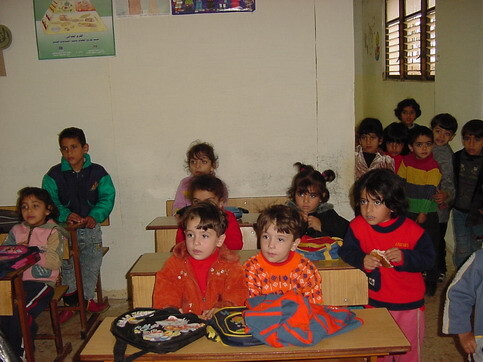
Children in Mas’ha await medical examinations in a classroom. (Dr. Bill Dienst)
Today the Mobile Clinic is working in Al Mas-ha, which is west of the Ariel settlement, and just north of the main Israeli highway from Ariel, before it dives down the hill toward Tel Aviv. West Bank Palestinians are only allowed to this point west, but no further.
Again we set up in the village municipality, which happens to be located right next to the kindergarten. Today, we will a different strategy to utilize my skills and stay out of the way of Dr. Hasam, who must move along at lightening speed, in order to survive the day.
I am sent with a nurse to the local kindergarten to screen about 50 children for dental disease, anemia, malnutrition, cardiac murmurs, and neuro-developmental delay. We don’t have time to do formal growth charts; I simply compare each child to his or her peers of the same age and rely on my intuition. Since we are all in the same room, this is easier than it would be if I were to see each child individually.
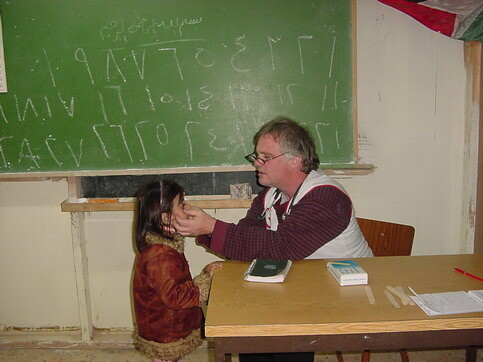
Dr. Bill Dienst examining a Palestinian child in Mas-ha. (Dr. Bill Dienst)
I do rapid screening to pick out children who may have a problem that needs referral for more in depth analysis. As each child steps forward, I ask, “Shu Ismak? (What is your name?)” The teacher helps with the names of children who answer timidly, and the nurse writes the names down in Arabic. I then pull their eyelids down to examine their conjunctiva for possible severe anemia, inspect their teeth and listen to their heart with my stethoscope. I then size up the child compared to peers in the same classroom, to look for stunted growth and poor cognitive development. Admittedly, these techniques are not as accurate as a more formal assessment might be, but it is the best we can do.
For the children who need more attention, I write down my impressions in English on a prescription sheet with the child’s name above in Arabic. (I.e. “check for anemia,” “needs dentist,” “needs growth nutritional or neuro-developmental assessment,” etc.) I probably spend no more than 3 minutes per child. Children that I designate as not completely normal will be assessed at a deeper level by Palestinian doctors later.
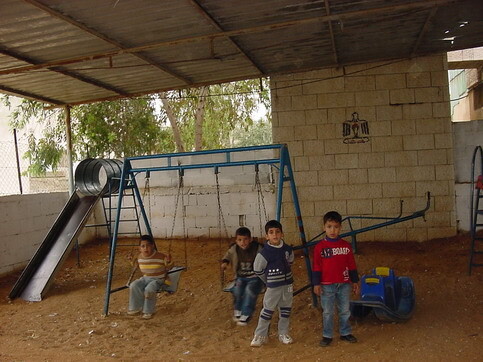
Children at a playground in Mas-ha. (Dr. Bill Dienst)
We find one little girl who has a thick keloid scar on her right arm. She has suffered from this as a result of an old burn. We take her over to the clinic, and I show Dr. Hasam how to give an intra-lesional steroid injection, which will hopefully make the keloid less disfiguring. We also inject another keloid on the left side of her neck, and I must be very careful not to inject deeper vital structures, like the carotid artery. The injection hurts; it takes 3 adults to hold her still and keep her from wiggling while I inject.
I hope this works; otherwise she may need to see a plastic surgeon, which her family probably cannot afford. Dr. Hasam will see her in a month to check the results, which will take this long to know. I hope he will e-mail me when I am back in the USA so I will know too.
On the way out of town, I learn more about this village’s history. Al Mas-ha was relatively prosperous before 2000, when the main road from Ariel passed through the village. Now a new Israeli-only highway bypasses the village and heads to Tel Aviv just south of here. The old road through Mas-ha now dead-ends at the annexation barrier; people who have money no longer pass through here and most of the businesses along this road have closed and are now boarded up.
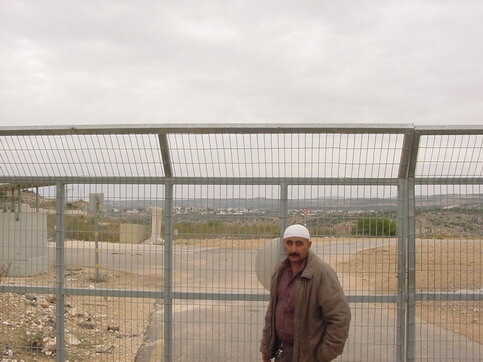
Hani Amr looks out from behind the fence confining him and his home away from his lands. (Dr. Bill Dienst)
We meet Hani Amr who was once a wealthy man. He owned a garden, tree nursery and flower shop, and people came from all around to buy from him, both Palestinian and Israeli. He was married in 1982 and now has 6 children. He has lived in the same home for 23 years. Unfortunately, Hani’s house just happens to be in the immediate course of the annexation barrier.
After the second intifada began in September 2000, the settlers damaged the fields where his flowers grew and confiscated most of his land; his business was systematically and deliberately destroyed. He tried to adjust by opening a poultry business which requires much less land. That too was destroyed by the settlers in 2002. In August 2003, the annexation barrier was built to protect Kana’, the settlement located just to West of Hani’s house. Its course left him and his family living in the middle of a No-Man’s Land between two fences. Now they are fenced in like animals from all 4 sides. His 40 dunams of land (10 acres) where he has olives, orange and lemon trees are now located on the other side of the fence. What used to be a 5 minute walk is now a long circuitous drive, which can take him up to 2 hours by car to get to his trees.
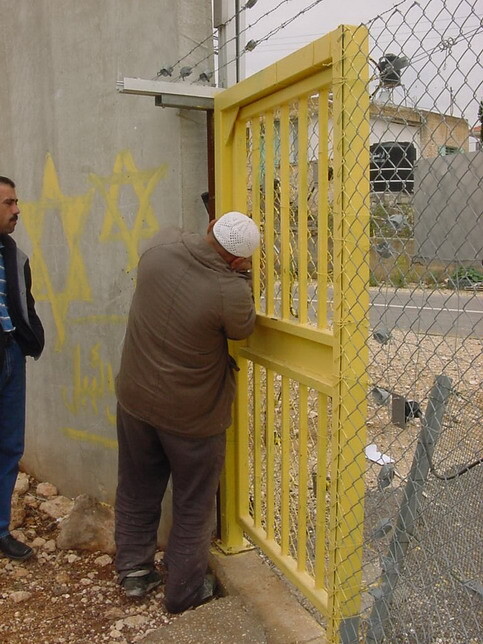
Hani Amr at the gate that controls access to his home through the fence. (Dr. Bill Dienst)
The barrier is slowly suffocating him; it leaves him with no job and no money. He now barely makes ends meet. He has gone from a once prosperous businessman to working odd-jobs as a day-laborer; he can only find work now maybe once or twice a week. He remains steadfast and still refuses to leave his home. “I am not leaving,” he says to Israeli soldiers, “Shoot me if you want.”
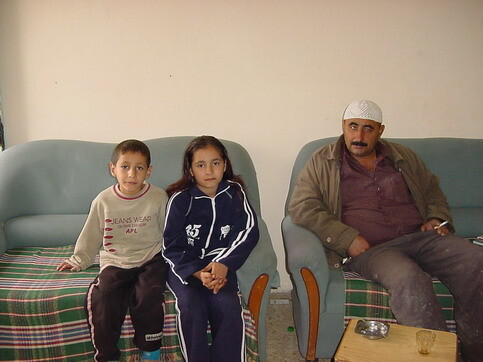
Hani Amr and his children. (Dr. Bill Dienst)
A spy-camera monitors all those who come and go from Hani’s home. When they arrive, he often receives phone calls asking, “Who is that visiting you now? What do they want? How long are they staying?” Etc. Constant harassment is the norm.
Through international pressure from the Norwegians and other European governments, the Israelis have conceded and have built a metal doorway with a lock and key so Hani and his family can get out from their cage to Mas-ha and then back to their home in the cage. At times, international human rights activists do home stays and give the family a respite from all the stress.
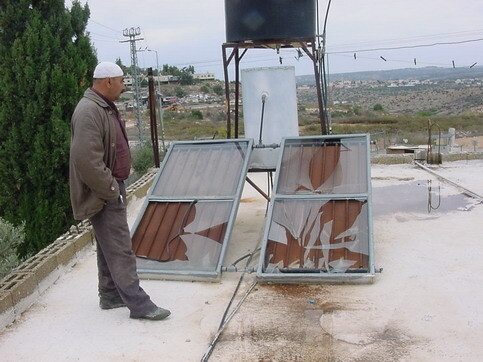
Hani Amr with his rooftop solar panels, smashed by settlers from Kana’. (Dr. Bill Dienst)
Every night, settlers throw stones had his home. They damage the solar water heaters on his roof. He repairs them and they are hit again multiple times. His children are afraid. His younger son suffers from Chronic Stress Disorder. Late at night and before the sun rises, Israeli Jeeps patrol the road along the barrier and shout through a megaphone, “Leave the house! You are here alone! You do not belong here any more!” Hani says this happens about twice a week.
About 3 times a month at around 10 pm they are forced from their home out into the elements and soldiers occupy the home for an hour at a time.

The fence near Hani Amr’s home, blocking the Israeli colony of Kana’ and declaring the area a military zone. (Dr. Bill Dienst)
I ask Hani if he has any messages he would like to convey to the American people. He believes that most American people are good, but the government of the USA and Israel are evil. People in the US are ignorant due to misinformation from major media like CNN/Fox/MSNBC, etc. “If the American people knew the truth, they would stop this,” he believes.
In the evening we return to Khaled’s house in his village called Qawaeen-Zed, population 3000. It is located southwest of Salfit. During this second intifada, this village has suffered 14 killed, 84 imprisoned, and 10 who are left with chronic serious injuries like amputations, paralysis, etc. I help Khaled’s family harvest their olive trees.
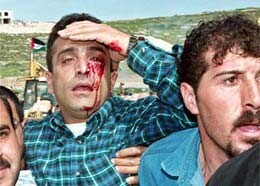
Ahmad Arar, the director of the loan center for medical equipment for Palestine Medical Relief Society immediately after he was shot in the left eye by a rubber bullet fired by Israeli soldiers during a Ramallah demonstration in March, 2001. Despite specialty opthalmologic care, he lost the vision in this eye as a direct consequence.
Ahmed lost vision in his left eye when he was shot by a rubber bullet during a demonstration in Ramallah in March 2001.
Dr. Bill Dienst is a rural family and emergency room physician from Omak, Washington, USA.




